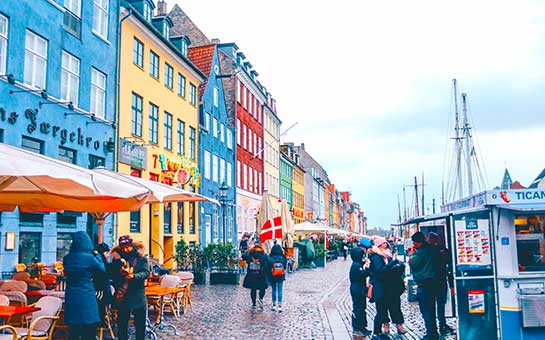For expats moving to Denmark, there's a lot to be delighted about.
Denmark’s health system is ranked among the best in the world is due to its large, public-funded hospitals and the National Health Insurance system (NHI).
The hospitals are well-maintained, staffed, and owned by the regional governments. The medical system is funded by taxes, and its services are provided at no cost to the public. Dental services, however, are not included in the public healthcare system and have to be paid upfront by the patient.
When you’re outside your country of citizenship, your risks are higher than those of a native. That’s why, even when you go to a country like Denmark with its fabulous healthcare system, you will still be able to breathe easier with a Denmark expatriate health insurance plan to protect you.
Before we get into its details, let's understand Denmark's healthcare system. The Danish Healthcare System is made up of:
Denmark Public Healthcare
The Danish healthcare system is decentralized, and counties under the five regional councils are responsible for providing free or subsidized healthcare to their citizens.
The public healthcare hospitals are operated by the five regional councils of:
- Region Nordjylland (North Denmark Region)
- Region Midtjylland (Central Denmark Region)
- Region Syddanmark (Region of Southern Denmark)
- Region Hovedstaden (Capital Region of Denmark)
- Region Sjælland (Region Zealand)
Who is eligible to use public healthcare in Denmark?
- Citizens of the country
- Individuals possessing the Danish National Health Insurance Card / yellow health card, also known as Sundhedskort
- Individuals with Danish permanent residency
- Expats working in Denmark for more than three months
- Children of expats from the first day of their stay in the country
- EU/EEA citizens with public healthcare insurance in their home countries
- Residents of Nordic countries (Norway, Sweden, Finland, Iceland, and associated territories of the Aland Islands, the Faroe Islands, and Greenland)
When is comes to healthcare in Denmark for foreigners, no visitor is denied emergency treatment in the country; however, you will have to pay out-of-pocket after the hospital stay.
Healthcare is not free for foreigners in Denmark. In fact, the health system is very expensive; hence, as an expat, you should have Denmark expatriate health insurance.
What do I need to use public healthcare in Denmark?
- Show your yellow health insurance card (also known as your EHIC).
- Show a valid national identification card or other proof-of-residence document if you are a Nordic resident.
Denmark public healthcare insurance includes:
- Free GP visits and access to primary medical care including routine treatment, examination, and consultation
- Specialist care if referred by the GP
- 24X7 emergency care and medical assistance
- Treatment at hospitals, including surgery and recovery
- Home nursing and home visits from a healthcare professional
Public healthcare insurance in Denmark does not include:
- Medicines: Some are subsidized, but you will still have to pay at least 25-50% of the price
- Dental care: It is free for minors under 18 years of age
- Elective cosmetic surgery
- Fertility treatment: Some subsidies may be available
- Psychiatric treatment: Some subsidies may be available with a doctor referral
- Physiotherapy
- Other non-medical or alternative treatments
Sundhedskort - The Yellow Card
This is a health insurance card that enables you to access public healthcare in Denmark. But to get this card, you will have to apply for a CPR number. A CPR is a personal registration number, which is necessary if you live in Denmark. To apply for CPR, you will need to provide proof of residence, as the card will be delivered to you.
Once you have a CPR number, you will be able to apply for a yellow card and gain access to free or subsidized public health services.
Denmark Private Healthcare
Due to a robust public healthcare system, the private healthcare system in Denmark is quite small. However, the services in the private system are superior. Public healthcare facilities are overcrowded, which is not the case when seeking treatment in a private health facility. Private health services can be a costly affair if you attempt to use them without expat health insurance.
Why Do You Need Expat Health Insurance in Denmark?
As an expat in Denmark, you will be eligible to apply for a CPR number and then the yellow health card only after having stayed in the country longer than three months. This means that during the first three months, if you need any medical treatment, you will have to pay for it upfront.
The healthcare services in Denmark are expensive, and paying out-of-pocket can affect your finances adversely. Hence, buying Denmark expat health insurance is the right choice.
What's Covered under Expat Health Insurance in Denmark?
Most citizens and expats in Denmark are covered under the public healthcare system. However, many opt for additional private insurance coverage because of:
- Treatment by exclusive doctors, practitioners, and other medical professionals.
- Shorter wait times.
- 24x7 visiting hours, private rooms, and better facilities.
- Advanced medical procedures, and special care.
Expat health insurance covers:
- Specialist consultation during a hospital stay.
- Wide range of cancer treatment.
- Hospital charges and emergency / planned surgery.
- Emergency coverage, evacuation, and repatriation.
- Dental care.
- CT, MRI scans, PET scans.
- Second medical opinions after diagnosis.
- Maternity coverage.
- Alternative therapies.
List of types of coverage expat health insurance provides:
- International Health Insurance
- Expat Life and Disability Insurance
- Travel Insurance
- Evacuation Coverage
- Group Expat Insurance Plans
Expat health insurance plans for Denmark can be tailored to meet your requirements and, in many cases, offer policies with no deductibles or excesses.
Buying an expat health insurance policy will ensure peace of mind for you and your loved ones in a country other than yours.

